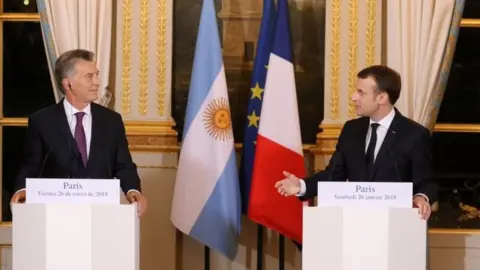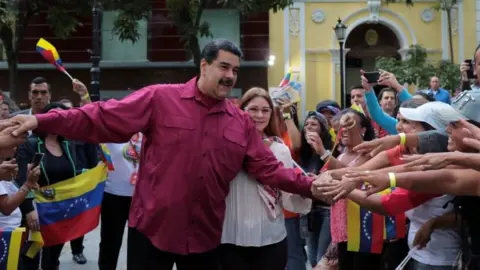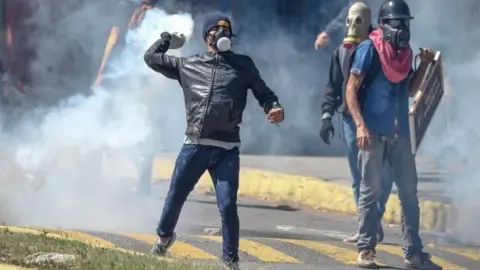Venezuela: France's Macron calls for tougher sanctions
 Reuters
ReutersFrance's President Emmanuel Macron has called for tougher sanctions against Venezuela, accusing it of violating democracy and human rights.
"It's not been a democracy for a long time," said Mr Macron.
His comments came after the Supreme Court in Caracas imposed restrictions on the main opposition coalition for presidential elections due in April.
On Monday, the European Union froze the assets and imposed a travel ban on seven senior Venezuelan officials.
Mr Macron said that there was no sign of progress from President Nicolás Maduro's government and called for a joint effort to help restore democracy in Venezuela.
'Institutions overrun'
"We'll have to see at the European level whether we want new sanctions. I am in favour of having them...
"I want us to go further given the recent decisions and the shift to authoritarianism," said Mr Macron.
He was speaking after a meeting in Paris with his Argentine counterpart, Mauricio Macri.
The two leaders criticised the decision by Venezuela's Supreme Court to ban the participation of the opposition in the presidential poll as a coalition, the Democratic Union Roundtable, or MUD.
 Reuters
ReutersThe electoral process had already been thrown in disarray on Tuesday, when the Constituent Assembly announced that the vote, traditionally held in December, would have to take place by the end of April.
The move leaves very little time for the opposition to prepare, as it is already weakened by the absence of many of its leaders who are in self-imposed exile or in jail.
Mr Maduro's six-year term ends next year. He announced he was standing for re-election "to put an end to the imperialist threat".
Mr Macri said that the institutions had been "clearly overrun in Venezuela".
"We need to demand free and transparent elections, so that Venezuelans can really express their views and start building a future," said Mr Macri.
 AFP
AFPFor some time now, the European Union has been expressing concern about human rights violations in Venezuela.
More than 120 people died during four months of protests against President Maduro last year.
This week, the EU targeted Venezuelan officials for the first time.
Spain pushed for the sanctions and paid a price for it: its ambassador to Caracas was expelled on Thursday and Madrid reciprocated with its own expulsion a day later.
Venezuela accused the Spanish ambassador of intervening in its internal affairs.
Now, Mr Macron has spoken out against the Maduro administration.
"Pressure on the regime will bear fruit when those who impose sanctions work together," he said.
